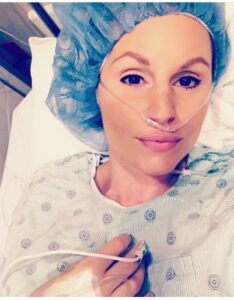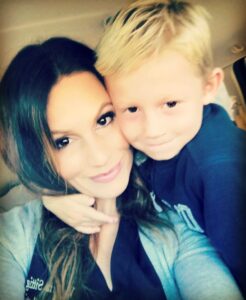We spoke with people in communities affected by PFAS contamination around the country as part of our research for the Say Never to Forever Chemicals campaign targeting corporate giant 3M. We were inspired by these fierce activists and are pleased to share their stories with you. After her own breast cancer diagnosis, Victoria Sittig Hicks, who lives in Brevard County, Florida, began to wonder why so many of her neighbors were also getting sick. Her work helped expose off-the-charts PFAS levels at a nearby air force base.
I’m not sad that I have cancer. I am angry. I’m angry for myself. I’m angry for my friend Kelly, who died of breast cancer at the age of 35. Most of all, I’m angry for our children. For Kelly’s beautiful daughter who will never scan the audience at her dance recitals for her mother’s reassuring smile. For my son Jaxson, age 7, who has seen me collapse and had to pick me up off the floor. Who shaved my head on my birthday after chemo started to take my hair.
I’m angry for every family that has had to deal with cancer because of corporate greed.
I grew up in Brevard County, in a beautiful town where I could watch rocket launches from my driveway. We are home to NASA, Kennedy Space Center, and Patrick Air Force Base, but because of that, we’re also home to highly fluorinated chemicals.
These chemicals include PFOA and PFOS, which are part of a large class of chemical compounds known as PFAS. PFAS, which were first developed by the corporation, 3M, are called forever chemicals because they don’t break down. These toxic compounds have been linked to cancer and many other serious health problems. Many experts believe PFAS increase the risk of breast cancer as well.

I received my breast cancer diagnosis in 2017, at the age of just 33, four months after my friend Kelly’s death. My doctor told me that my cancer was ER/PR-negative and HER2-positive, and that cancer was in two of my lymph nodes. I was officially diagnosed as Stage 3. They started my treatment with six rounds of chemo. After my second treatment, my body started hemorrhaging and I lost so much blood that I was only 24 to 48 hours away from dying. I thought it would be ironic if my treatment killed me before my cancer had the chance to. Luckily, they were able to get my hemorrhaging under control and change my treatment plan to prevent it happening again.
The treatment was grueling: chemo, then 11 rounds of Herceptin. Every three weeks for a year I pumped my body full of drugs that took my hair, made me sick, and wore me down. Kill the cancer before it kills you. In the midst of that, I had a double mastectomy. Six weeks later, I began radiation, which continued through the start of the New Year. Six months later I had my breast reconstruction surgery.
During all this time, I prayed that nothing would happen to me during the nights when Jaxson was with me. I couldn’t bear the thought of him dealing with the trauma of finding me. But I was also petrified that if I died on a night when he wasn’t there, I would die alone and how long would it be until I was found?
I was sick, but I was also angry, and the more I learned the angrier I became. My cancer was never a “how could this have happened to me?” situation. My dad, who was in the military, was just 38 when I lost him to testicular cancer. (I’ve since learned that testicular cancer, rates of which are high among men in the military, has been linked to PFAS exposure.) To me, cancer was always possible, but I was not going to sit meekly by and watch it happen. I began to talk to other people who had cancer, or who had loved ones with the disease. I began to wonder: why are so many people getting sick?
It turns out that Dr. Julie Greenwalt, who graduated from the same high school I did, was wondering the same thing. She had cancer herself, and had two close friends who died of breast cancer in their late 20’s. We started a Facebook group, and before long, we’d heard from 1,000 local people who knew someone with cancer, or had cancer themselves (close to 400 of those were breast cancer cases). We also connected with Stel Bailey, who started the group Fight for Zero after she and two family members were diagnosed with Non-Hodgkin Lymphoma. We tagged and emailed activist Erin Brockovich so relentlessly that one day she wrote, “Satellite Beach I hear you! I’ll be there soon!” When she came to speak, 400 people showed up.
For 30 years there had been rumors about contamination on and near Patrick Air Force Base, and many people had raised concerns about the high number of cancer cases. These concerns were always swept under the rug. Not this time! We spread the word, contacted the media, and collected stories from other local residents with cancer. We organized a town hall meeting and demanded that our water be tested. When the tests came back positive for PFAS, that’s when it all became real – and even worse than we’d feared. Tests showed that PFAS at Patrick Air Force Base are 390,909 times the levels considered safe by the Centers for Disease Control. When I heard the astronomical level of PFAS in our water, I couldn’t stop the tears falling down my cheeks. My son lives here.
At recent hearings in Washington, Congresswoman Debbie Wasserman Schultz confronted 3M about the alarming PFAS contamination at Patrick Air Force Base, and demanded answers. The 3M representative deflected the questions and denied that PFAS pose a health risk.
We’re still waiting to hear what is going to be done about our contaminated water. Meanwhile, I refuse to let any more families be affected by this epidemic, and I’m doing all I can to get the word out about PFAS and their toxic effects. As a supporter of Breast Cancer Action’s Say Never to Forever Chemicals campaign, I sent a letter to 3M (the company continued to make and sell PFAS years after they knew the dangers). I hope you’ll join me.
Please don’t think just because some of us survived that all’s well that ends well. My son has seen so much that he would rather sleep with me than alone. Every time I cough, my first thought is “Is the cancer back?” Cancer will haunt us for the rest of our lives and it’s all because I grew up next to an Air Force base and got to watch the space shuttle from my driveway. Quite the heavy price to pay.
I don’t want money or pity or recognition.
I just want more time with my son. And a world without PFAS.
My name is Victoria Sittig Hicks and I am a single mom of the most incredible seven-year-old boy. On May 12, 2017 I was diagnosed with breast cancer. I am the first in my family to ever get breast cancer. I have an environmental cancer that I believe was caused by growing up and going to school near Patrick Air Force Base, where PFAS were used for decades, causing environmental and water contamination in our county. 3M, this HAS TO STOP. Your pockets are not worth our lives.